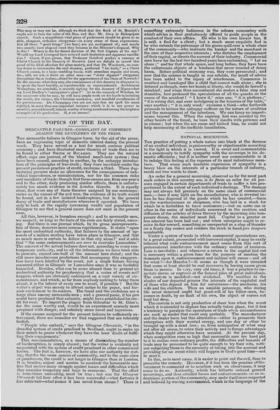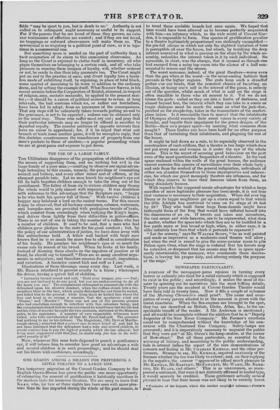NATIONAL MOURNINGS.
THE practice of putting a whole nation into black at the decease of an exalted individual, is praiseworthy or objectionable according to the light in which it is viewed. It is sweet and commendable in a community to testify sympathy with the sovereign in his do- mestic afflictions ; but it is neither sweet nor commendable in it to indulge this feeling at the expense of its most industrious mem- bers. That every such laudable expression of sympathy is a heavy blow on the interests of a particular branch of industry, needs not two words to show.
An order for a general mourning, observed as for the most part such orders in this country are, is de facto an order for all per- sons engaged in certain departments of trade to suffer a loss pro- portioned to the extent of each individual's dealings. The damage may not always fall precisely on the same class of commercial men ;—here it may light on the manufacturer, who is arrested be- fore he has disposed of the goods which he has created,—there on the warehouseman or shopman, who has laid in a stock for which he is forbidden to have customers ;—but on some one or other in the series of individuals concerned in the creation and diffusion of the articles of dress thrown by the mourning into tem- porary disuse, the mischief must fall. Capital to a greater or less amount has been laid out ; and when enterprise ought to re- ceive its fair reward, something as unexpected as a clap of thunder on a frosty day comes and renders the stock in handpro tempore unsaleable.
Under a system of trade in which commercial speculations are, to a great extent, prosecuted with borrowed capital, it may be easily inferred what wide embarrassment must ensue from this sort of preternatural interference with the ordinary routine of business. Loss is inevitable ; and wherever a return to the capital laid out is necessary within a given time for the purpose of meeting the demands upon it, embarrassment and failures will ensue—and all for what ?—for Hecuba !—It seems as though it were intended that some at least should be real mourners by having cause given them to mourn. In very, very old times, it was a practice to im- molate slaves or captives at the funeral piles of great individuals. The custom is modified—not abolished. We sacrifice to the shades of our departed princes the interests of the capitalist and of those who depend on him for subsistence—the mechanic, his wife and his children. Thus an amiable personage, who during life never deserved ought but good-will of his fellow-men, be- comes in death, by no fault of his own, the object of curses not loud but deep. The custom is not only productive of sheer loss when the event which it is intended to deplore has actually taken place, but it has a tendency to paralyze the operations of trade when circumstances are such as render that event only probable. The manufacturer and the dealer have but this alternative—either to prosecute their enterprises with their wonted energy, and one day or other be brought up with a dead loss ; or, from anticipation of what may not after all ensue, to relax their activity and to forego advantages which they might otherwise have secured. At the present day, when competition runs so high that mercantile men are hard put to it to realize even ordinary profits, the difficulties and hazards of trade may be presumed to be quite enough to try their wits, with- out subjecting them to the necessity of taking into the account and providing for an event which will happen in God's good time—not in man's.
In this, as in most cases, it is easier to point out the evil, than to prescribe the remedy. However, if it has been the practice of Go- vernment to command or to sanction such an observance, it may cease to do so. Authority, which has hitherto ordered general mournings, and thus entailed losses and embarrassments on an in- dustrious portion of the community, may make itself more respected and beloved by waving a ceremonial, which in the language of the fable "maybe sport to you, but is death to us." Authority is not called on to relinquish aught necessary or useful to its support. For if the powers that be are loved of those they govern, no exte- rior testimonies of affection are wanted; and if they are not loved, no trappings or outward observances will make them so. The ceremonial is as nugatory in a political point of view, as it is inju- rious in a commercial one.
But something more is needed on the part of authority than a tacit resignation of its claim to this unmeaning observance. As long as the Court is enjoined to clothe itself in mourning, all who pique themselves on belonging to a certain rank, and all who take pleasure in wearing these insignia of loyalty, will, whether ordered or not, be ready to don their inky garments too. The Court might put an end to the practice at once, and divert loyalty into a harm- less mode of exhibiting itself, by enjoining, in place oi total black, some symbol of mourning to be worn in addition to the ordinary dress, and by setting the example itself'. What SIDNEY SMITH, in his recent sermon before the Corporation of Bristol, observed, in respect of religion, may, nzutatis mutandis, be applied to the present mat- ter ;—it should be a canon of political economy to revise, at long intervals, the bad customs which we, or rather our forefathers, have been led to adopt, from an ignorance of the consequences. That any steps will be voluntarily taken towards putting an end to the grievance, is not to be expected ; redress can be obtained only in the usual way. Those who suffer must cry out ; and pray that their particular interests may no longer be offered in sacrifice to departed royalty. The counter petitions of opposite interests they have no cause to apprehend; for, if it be urged that what one branch of trade loses another gains, it will be enough to reply, that this doctrine countenances the transference of property from one man's pockets to those of another,—a popular proceeding which we are at great pains and expense to put down.



















 Previous page
Previous page